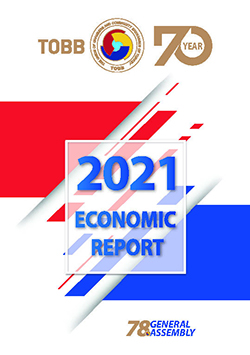e-Commerce Council meeting with the participation of Competition Council President Küle

09.04.2021 /
The Union of Chambers and Commodity Exchanges of Turkey (TOBB) e-Commerce Council met via videoconference to hold sectoral consultations under the chairmanship of Council President Ozan Acar and with the participation of Competition Council President Birol Küle.
After giving information about the structure and work of the Council, Council President Ozan Acar explained the stage of the e-commerce ecosystem and its contributions to the Turkish economy. In his speech, Acar drew attention to the intense competition and dynamic market structure that has been instrumental in the formation of very successful domestic digital initiatives on a global scale. In addition, Acar stated that e-commerce increases business dynamism by bringing hundreds of thousands of businesses together with tens of millions of consumers, and stated that public intervention and guidance is needed to eliminate the uncertainties and problems that may arise as a natural result of rapid digitalization. In this respect, he emphasized the importance of pursuing a policy objective that will increase the benefits of the e-commerce ecosystem throughout the economy and support fair, transparent and innovative initiatives in the design of the regulatory framework that the Competition Authority is working on. Acar added that as the Turkish e-Commerce Council, they are ready to contribute to the work of the Competition Council.
- Competition Council President Birol Küle
In his address to the council members, Birol Küle, President of the Competition Council, talked about how they position themselves in the digital economy as an institution, their responsibilities, what they have done so far and what they will do in the future.
“As digitalization transforms societies today, it gives the practitioners of competition law and the general competition law regime the most serious corporate innovation test in its history all over the world. Although it is not only the problem of competition law that digital platforms make a “digital copy” of the data they collect for each consumer, and data generation from each asset (such as geographical locations) in a way that is unimaginable in traditional markets, has to play a leading role in its solution.
Especially in developed economies, sectoral concentrations, overgrowth of large technology firms and persistence of high prices in many critical sectors without any economic justification are putting serious pressure on public policymakers. While new entries to the market are steadily decreasing, established companies are facing a declining number of competitors in many sectors. This impedes business dynamism. If your competitors don't have the ability to innovate, you won't have the drive to strive for innovation.”
- “Secure functioning is essential”
Pointing out that digital platforms mediate for more than half of total consumption, Competition Council President Birol Küle said, “Secure functioning and non-discriminatory access conditions, transparency as well as no disruption to general commercial activities is essential. Competition law, as you know, is mainly shaped around the concept of ‘market power.’ Technically, when we look deeper at this main concept, which is defined as ‘the ability to determine prices and other competitive parameters independently of competitors and consumers,’ we understand more clearly how data and privacy policies are used as a means of disrupting competition with large digital platforms, and in particular with data generation strategies. This concern points to issues that include not only the protection of individual consumer rights, but are much more serious than that.”
- Increasingly necessary legal instruments
Noting that some legal instruments and norms that are not needed in traditional markets have gained importance with digitalization, Küle said: “In a traditional market, there is a limit to economies of scale and scope, while increasing returns on platforms risk that the first penetrator is almost invincible. Although these actors are primarily products of innovation, over time they can implement behaviors and strategies that will monopolize innovation.
The biggest share of this is undoubtedly the multilateral business model, which looks ‘zero priced’ but is based on consumers paying with their data. In this system, which is based on continuous data collection and profiling in real time with machine learning, it is inevitable that the built-in platform dictates the trading conditions to all actors in the lower and upper market.
Our organization's recent investigations into digital platforms have also found that the competitive behavior and practices of built-in platforms penetrate deeply into the entire supply chain, affecting consumers, commercial users of platforms, and competing platforms.
In these reviews and investigations, findings support the assertion that the traditional tools and rules just mentioned are inadequate to combat competition problems in these markets, and these findings reinforce the need to make precursor (ex ante) regulations to complement the rules of competition law for digital markets in our country.
The sole goal of all these efforts and decisions is to accelerate the momentum of innovation in our country, to ensure that all our effective entrepreneurs have access to platforms, and to create benefits that can only be actualized in environments of healthy competition such as employment and investment. The latest analysis reveals that global FDI (greenfield) reductions of 40% in 2020 have reversed, new e-commerce opportunities are increasing in service sectors, especially international e-commerce will gain momentum.
With the competitiveness of the playing field, players of all sizes will benefit from these new and global commercial opportunities. The ideal market structure is multiplayer, where competitive pressure brings continuous improvement, where growth is not exclusive to one or two players, where an enterprise that achieves innovation is not copied or inherited by the residents.
Unfortunately, the establishment of this structure all over the world is far from being provided yet. Let me finish by reminding you that when the gap between ideal and reality is too wide, the system collapses.”
Both our amendment to the Law last year and our ongoing work are, more importantly, a guarantee that we will achieve ideal-reality overlap with our altruistic and strong staff.”
Your message has been sent
Thank you |
News Title |




